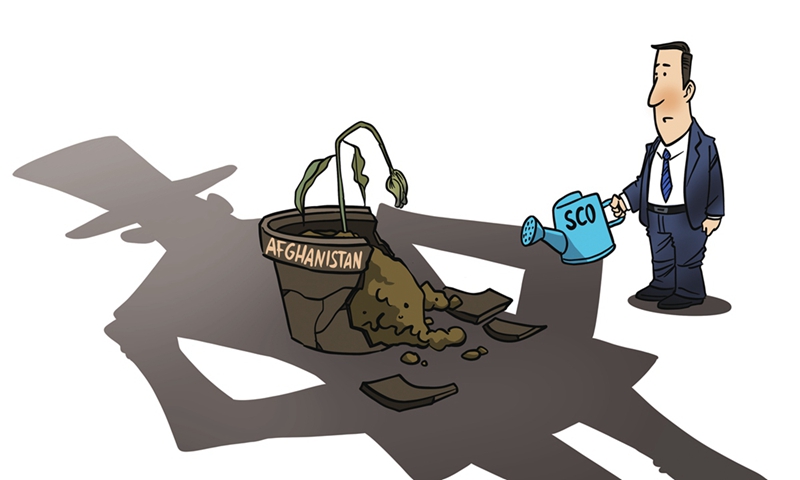SCO’s role in Afghan issue constructive

Illustration: Liu Rui/GT
The Shanghai Cooperation Organisation (SCO) has always paid great attention to the Afghan issue. Especially after US' hasty withdrawal from Afghanistan in 2021, many observers from the international community have focused on how the SCO can and will address the hardship Afghanistan faces.
Days before the SCO Samarkand summit, which just concluded on Friday, many foreign media outlets highlighted the Afghan issue as one of the crucial topics for the meeting. Both the remarks delivered by Chinese President Xi Jinping at the 22nd Meeting of the SCO Council of Heads of State on Friday and the Samarkand Declaration signed by the SCO member states on the same day underlined the Afghan issue, which fully demonstrated the great importance the SCO has attached to Afghanistan.
In comparison to the US and Western countries or the blocs headed by them, the SCO's manner in dealing with the Afghan issue is obviously more constructive for Afghanistan and its people. The US and Western countries have always attempted to transform Afghanistan by ideological infiltration and export of Western-style "democracy." They tend to support one faction against another by resorting to military means, which has triggered even more violence and conflicts rather than settling them. This can be illustrated by the 20-year war in Afghanistan - What it left for the country has been nothing but complete devastation and more hardships that the Afghan people had to suffer, Yang Jin, an associate research fellow at the Institute of Russian, Eastern European and Central Asian Studies at the Chinese Academy of Social Sciences, told the Global Times.
By contrast, the SCO, under the guideline of the "Shanghai Spirit," which features mutual trust, mutual benefit, equality, consultation, respect for diverse civilizations and pursuit of common development, has always played the role of a promoter, an aid provider, a mediator as well as a contributor to push the settlement of the Afghan issue.
President Xi said at the SCO Samarkand summit that "We should ensure that the SCO-Afghanistan contact group and the mechanism of coordination and cooperation among Afghanistan's neighbors continue to play their roles."
Almost all SCO member states including China have participated in various mechanisms to address the Afghan issue, sticking up for Afghanistan's sovereignty and independence, support the "Afghan-led and Afghan-owned" principle, the peace and reconciliation process in Afghanistan, and not interfere in Afghanistan's internal affairs, in the hope of Afghanistan achieving its peaceful development.
The Afghan issue is definitely the main concern of the SCO, given its member states' geographic positions, as well as the purpose of the group itself. In terms of geography, almost all SCO members are Afghanistan's peripheral countries. The situation of Afghanistan will certainly affect the security and stability of these countries.
The SCO was born more than two decades ago with a fundamental mission to combat the three forces of terrorism, separatism and extremism. Afghanistan is precisely the country where extremist and terrorist forces have been rampant, affecting surrounding regions such as Central Asia, South Asia and the Middle East. Despite the so-called war on terror that lasted 20 years, the ground that breeds terrorism in Afghanistan has not been removed, and the international community is still vigilant about whether extremist forces will rise in Afghanistan.
These factors can explain why SCO member states said in the Samarkand Declaration that the coordination of the situation in Afghanistan at an early date is one of the important factors for maintaining and consolidating security and stability in the SCO region.
The declaration also stressed the member states "consider the active engagement of the international community in facilitating their [Afghan refugees'] dignified, safe and sustainable return to their homeland to be essential."
This is because the Afghan issue is very complex. Essentially, it is a mess left behind by the US and US-led NATO, under the banner of "anti-terrorism." For both Afghanistan's internal issue and the spillover of the Afghan issue through extremism and terrorism, it requires joint efforts from not only the SCO and regional countries, but also the international community, especially the US and the West, said Liu Zhongmin, a professor at the Middle East Studies Institute of Shanghai International Studies University.
The SCO member states also underline "the value of the long-standing hospitality and effective assistance extended by regional and neighboring countries to Afghan refugees" in the Samarkand Declaration.
This is indeed the case. One year ago, the US pulled out from Afghanistan hastily and irresponsibly, leaving behind a devastated country and parties without a peace agreement. But Afghanistan is still in a manageable situation, not completely out of control and fell into large-scale disorders. This can be largely attributed to various bilateral and multilateral efforts of the SCO and its member states, noted Liu. In the face of many humanitarian crises and Afghan people's hardships, the SCO and many of its member states have always been willing to provide Afghanistan with humanitarian assistance.